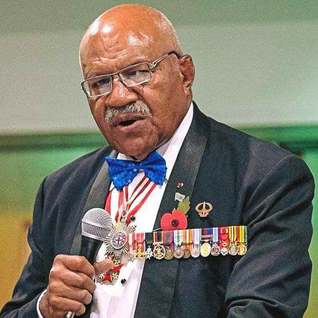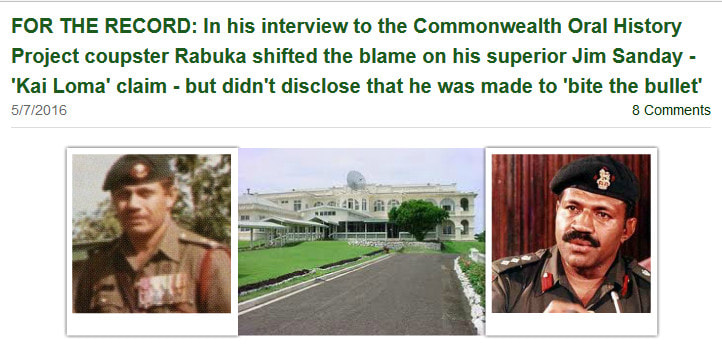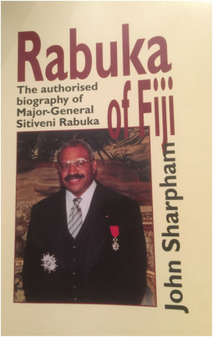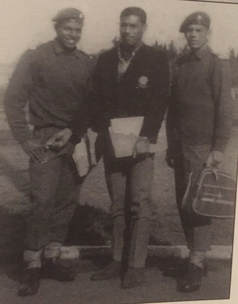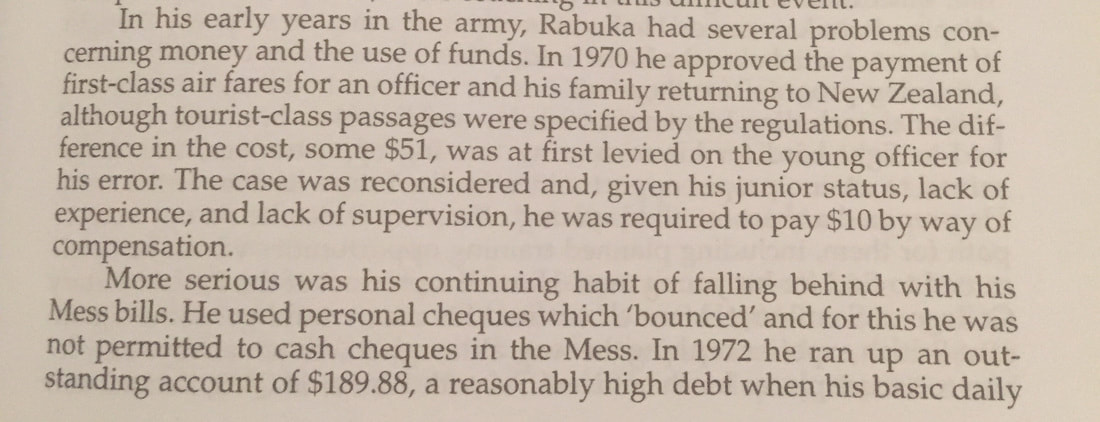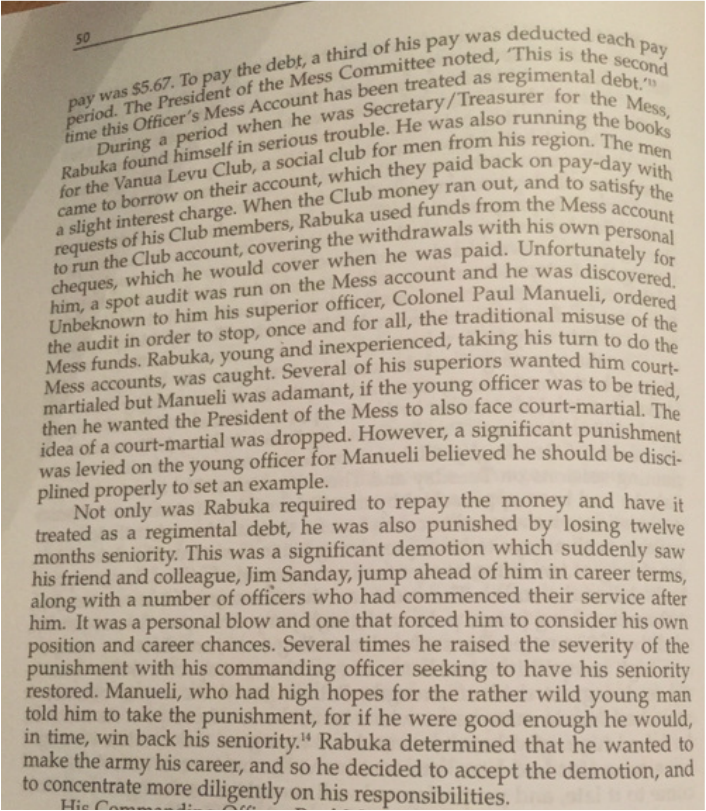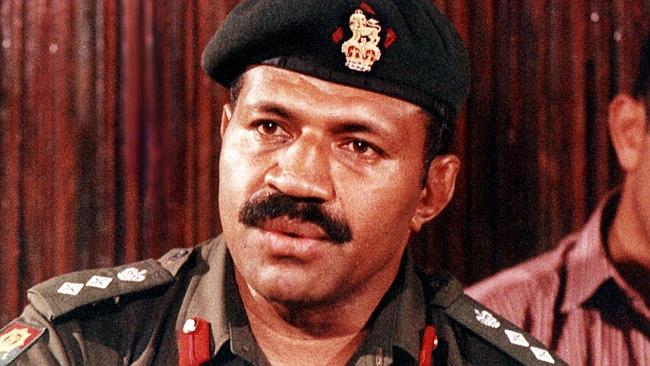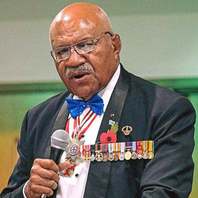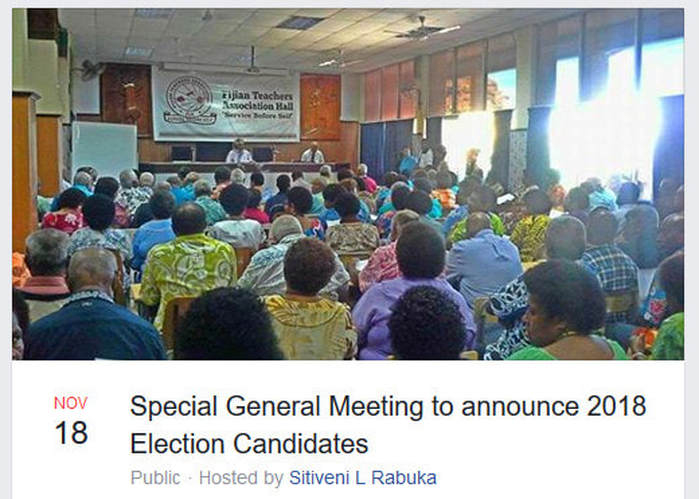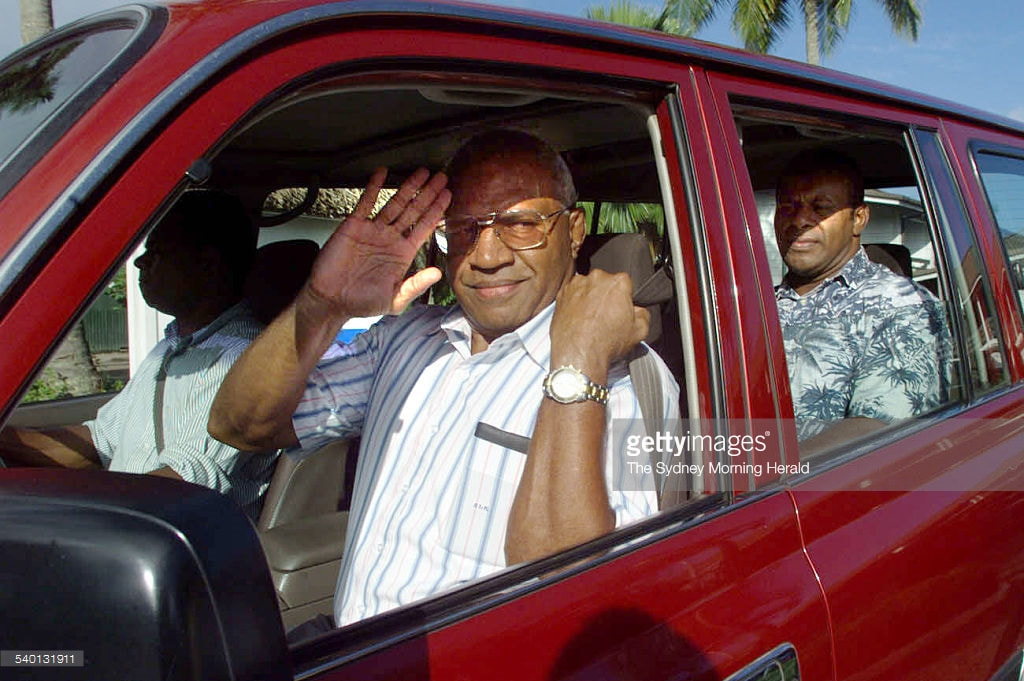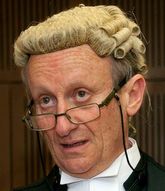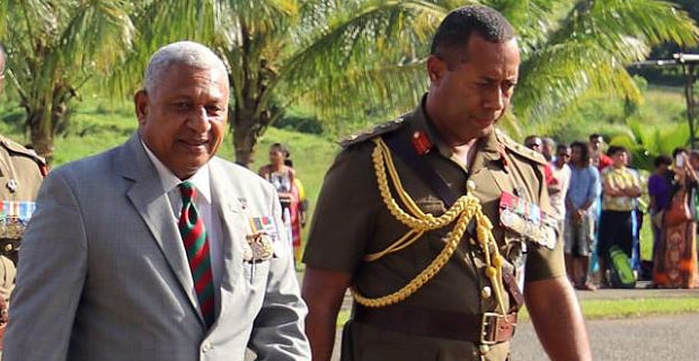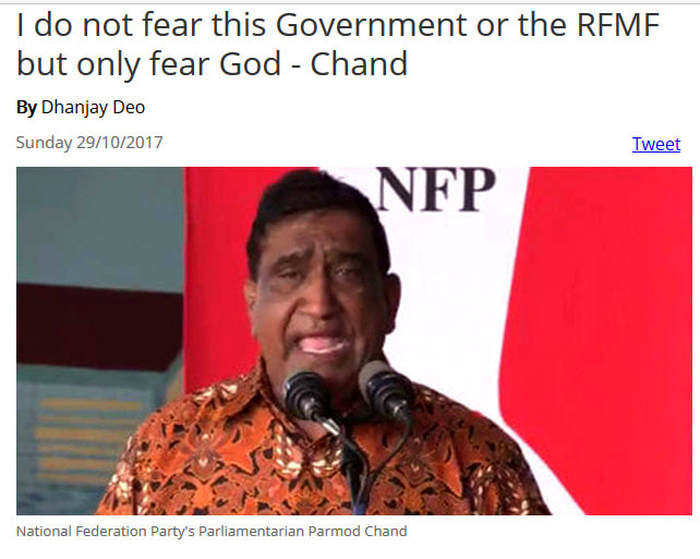ALL THAT GLITTERS IS TO FOOL: Coupist and Sodelpa leader Sitiveni Rabuka [photo below] in Brisbane, Australia, last week promising 'heaven' to Fiji while waxing lyrical about his 'illustrious military career' to his cheering overseas mob. But only last year he was falsely accusing another fellow military officer, now residing in Brisbane - JIM SANDAY - of persuading him [Rabuka] to execute the coup. SANDAY denied it
Last year Rabuka told a Commonwealth Oral Histories project recording momentous events in Commonwealth history that he only executed the coup after a 'KAI LOMA' army officer - Lt Colonel Jim Sanday, the then RFMF Chief-of-Staff, told him to DO IT.
Sanday denied Rabuka's claims in June 2016 after we had published the Rabuka interview
[SHIFTING BLAME! Rabuka: “Either you or the Commander have got to do this. I can’t do it: I’m KAI LOMA, I’m a white European [JIM SANDY].”
Bula Victor,
My attention has been brought to your post above by some of my friends who follow your site.
For the record, I categorically deny that I did utter those words.
If I did, then it implies I had foreknowledge of the coup.
I had no pre-knowledge and was never involved in the 1987 coup plot.
With respect
Jim Sanday
Brisbane, Australia
From Fijileaks archive, 2016:
The then Chief of Staff Jim Sanday had stood before Rabuka shortly after the 14 May 1987 coup and had ordered him (Rabuka) to hand to him (Sanday) his (Rabuka's) 9mm Browning pistol and to empty the NINE bullets if he wanted to enter Government House to speak to the Governor-General Ratu Sir Penaia Ganilau...Rabuka sheepishly complied and in Sanday's presence, unloaded the bullets.
In retaliation, Rabuka denied Sanday the Fiji Republic Medal because he [Sanday] did NOT support the 1987 coups - Rabuka promoted himself (told Ratu Penaia) to promote him as Major-General of the RFMF

In his Commonwealth Oral History Project interview Sitiveni Rabuka claimed that it was Sanday who had asked him to carry out the 1987 coups. Replying, Sanday has denied the claim. In the same interview Rabuka also claimed that he had deliberately set up an interview between Sanday and Ratu Penaia so he (Rabuka) could go ahead with his coup plan.
But we can disclose for the first time what has not been spoken about or revealed by Rabuka in his autobiography No Other Way and the sanctioned biography Rabuka of Fiji.
As we know, Rabuka had rocked up to Government House on 14 May 1987 after the coup at 10.00am. A day before, he had arranged for his immediate superior Lt-Colonel Sanday to represent him for a briefing meeting on national security with Ratu Penaia. In fact, Rabuka had set up the meeting through Ratu Penaia's ADC Lesi Korovavala, a third class ambitious and unimpressive young officer. It was Korovavala who had rung Sanday's wife on 13 May to arrange the meeting.
A Fijileaks investigation reveal that when Rabuka turned up to Government House, Sanday went out to meet him before he [Rabuka] went in to see Ratu Penaia. Sanday saw that he (Rabuka) had a 9mm Browning pistol in his pocket. He had arrived with his escort of soldiers, some of whom were members of the Army Rugby 1st XV. Sanday was President of the Army Rugby Club and they turned away out of shame when Sanday went out to meet them.
As his life time Army buddy and as his Commanding Officer at the time, and, in the best traditions of a professional military officer that Sanday was, he invited the coupist Rabuka to remove the pistol from his coat pocket and unload it as there was no need for him to take a loaded pistol into discussions with the Queens representative in Fiji.
Rabuka sheepishly complied and in Sanday's presence unloaded nine (x9) 9mm rounds from the magazine of the 9mm Browning pistol which he carried with him to Government House.
Sanday realized there and then, that his dear Army buddy that he had joined the Army together with in January 1968, and in whom Sanday had given him his (Sanday's) complete trust, had a darker side to his character that was prepared to shaft his closest buddies in his quest for his self-serving quest for national leadership.
The coupster never forgave Sanday. When Rabuka introduced the Fiji Republic Medal, Sanday was told by senior officers loyal to Rabuka that he was not entitled to it because he did not support the coup. So Sanday told them to shove that medal up where the sun don't shine. And, Sanday has never worn that medal since.
But we can disclose for the first time what has not been spoken about or revealed by Rabuka in his autobiography No Other Way and the sanctioned biography Rabuka of Fiji.
As we know, Rabuka had rocked up to Government House on 14 May 1987 after the coup at 10.00am. A day before, he had arranged for his immediate superior Lt-Colonel Sanday to represent him for a briefing meeting on national security with Ratu Penaia. In fact, Rabuka had set up the meeting through Ratu Penaia's ADC Lesi Korovavala, a third class ambitious and unimpressive young officer. It was Korovavala who had rung Sanday's wife on 13 May to arrange the meeting.
A Fijileaks investigation reveal that when Rabuka turned up to Government House, Sanday went out to meet him before he [Rabuka] went in to see Ratu Penaia. Sanday saw that he (Rabuka) had a 9mm Browning pistol in his pocket. He had arrived with his escort of soldiers, some of whom were members of the Army Rugby 1st XV. Sanday was President of the Army Rugby Club and they turned away out of shame when Sanday went out to meet them.
As his life time Army buddy and as his Commanding Officer at the time, and, in the best traditions of a professional military officer that Sanday was, he invited the coupist Rabuka to remove the pistol from his coat pocket and unload it as there was no need for him to take a loaded pistol into discussions with the Queens representative in Fiji.
Rabuka sheepishly complied and in Sanday's presence unloaded nine (x9) 9mm rounds from the magazine of the 9mm Browning pistol which he carried with him to Government House.
Sanday realized there and then, that his dear Army buddy that he had joined the Army together with in January 1968, and in whom Sanday had given him his (Sanday's) complete trust, had a darker side to his character that was prepared to shaft his closest buddies in his quest for his self-serving quest for national leadership.
The coupster never forgave Sanday. When Rabuka introduced the Fiji Republic Medal, Sanday was told by senior officers loyal to Rabuka that he was not entitled to it because he did not support the coup. So Sanday told them to shove that medal up where the sun don't shine. And, Sanday has never worn that medal since.
The Mess Up with Officers Mess Fund saw Jim Sanday jump ahead of Sitiveni Rabuka in career terms
OPERATION KIDACALA |
"During a period when he was Secretary/Treasurer for the Mess, Rabuka found himself in serious trouble. He was also running the books for the Vanua Levu Club, a social club for men from his region. The men came to borrow on their account, which they paid back on pay-day with a slight interest charge. When the Club money ran out, and to satisfy the requests of his Club members, Rabuka used funds from the Mess account to run the Club accounts...Unfortunately for him, a spot audit was run on the Mess account and he was discovered. Unbeknown to him his superior officer, Colonel Paul Manueli, ordered the audit in order to stop, once and for all, the traditional misuse of the Mess accounts. Several of his superiors wanted him court-martialed but Manueli was adamant, if the young officer was to be tried, then he wanted the President of the Mess to also face court-martial. The idea of a court-martial was dropped. However, a significant punishment was levied on the young officer for Manueli believed he should be disciplined properly to set an example. Not only was Rabuka required to repay the money and have it treated as a regimental debt, he was also punished by losing twelve months seniority. This was a significant demotion which suddenly saw his friend and colleague, Jim Sanday jump ahead of him in career terms, along with a number of officers who had commenced their service after him."
Fijileaks: In 1987, the third-ranking army officer Rabuka not only overthrew Sanday in a cowardly coup, assisted by soldiers from his village and the province, but he also became Commander of the RFMF, promoting himself as Major-General, and was lately showing off those 'coup medals' in Brisbane, Australia; the abuse of funds continued - in fact, became a scandal, after the Rabuka coups in 1987 that saw the Cakaudrove Provincial Council disappear with $73,179.64 from the National Bank of Fiji, not to forget his fellow 'coupist' debtors names from his province, and elsewhere in Fiji
Last week SODELPA were selling RABUKA as Fiji's next Prime Minister. He told his adoring fans he always wanted to be a soldier. So what did he do? He became one, liu muried fellow army officers, misused the Officers MESS FUND, carried out two coups, promoted himself Major-General, got Immunity, and changed his tune from "No Other Way" to blaming Lt-Colonel Jim Sanday, basically claiming he carried out the coups "Sanday's Way". Now, he is not only SODELPA leader but is waxing lyrical about his grand vision and leadership qualities he possesses!
MY DREAM AS A YOUNG BOY
"Please allow me to tell a personal story, so far only known to my family and those who were with me in Class 6 at Provincial School Northern, Bucalevu, Taveuni, Cakaudrove in 1958. We were asked by a Mr Stevens, the Visiting Education Officer, Taveuni; ‘What do you want to be when you leave school?’ Some boys said they wanted to be teachers, doctors, policemen, and join other professions, but I was the only one who wanted to be an Army Officer. I was severely ridiculed, because I was the smallest and youngest boy in our class. I was 9 years and six months old and was in Class 6, and I had a dream to become an Army Officer! Ten years later, at the age of 19 and three months, I was accepted into the Fiji Military Forces to undergo Officer Training. I arrived at my dream! I refused to be distracted from my dream. Nineteen years after that, at the age of 38 and 8 months, I was Commander of the Fiji Army [Fijileaks: After treasonously seizing power as a third-ranking army officer]. What comes to mind, is what the great Mahatma Gandhi once said “Champions are made from something they have deep inside of them-a desire, a dream, a vison.”
"My vision for Fiji is based on my conviction and my faith that we must build a united and progressive Fiji where we can live in peace and in harmony with each other.
At the same time we must all acknowledge, embrace and recognise native rights or indigenous rights which is not discriminatory but consistent with and embodied in United Nations Declaration on Indigenous Rights and the ILO Convention No. 169 on Indigenous and Tribal Peoples.
All communities must embrace that indigenous rights are human rights that must be respected and embraced by all facets of socio-economic development.
I sincerely believe that strong leadership, and the will and commitment to listen, gives me the opportunity to realise my dream.
The key elements of strong leadership that I will continue to embrace is good governance based on a number of characteristics and values. These include:
- Leadership that encourages effective participation of all citizens in the decision making to embrace ownership in policies;
- Leadership that is committed to consensus building to awaken and embrace the collective will of the majority.
- Leadership that is responsive, effective, efficient, inclusive, and equitable.
My vision can only be realised with your generous support.
We must work together to realise our collective dream to build Fiji to be a progressive, dynamic and united country as we move towards the elections in 2018."
~ Sitiveni L Rabuka (speech given 28/10/17 at the SODELPA Queensland Spring Ball in Brisbane, Australia)
At the same time we must all acknowledge, embrace and recognise native rights or indigenous rights which is not discriminatory but consistent with and embodied in United Nations Declaration on Indigenous Rights and the ILO Convention No. 169 on Indigenous and Tribal Peoples.
All communities must embrace that indigenous rights are human rights that must be respected and embraced by all facets of socio-economic development.
I sincerely believe that strong leadership, and the will and commitment to listen, gives me the opportunity to realise my dream.
The key elements of strong leadership that I will continue to embrace is good governance based on a number of characteristics and values. These include:
- Leadership that encourages effective participation of all citizens in the decision making to embrace ownership in policies;
- Leadership that is committed to consensus building to awaken and embrace the collective will of the majority.
- Leadership that is responsive, effective, efficient, inclusive, and equitable.
My vision can only be realised with your generous support.
We must work together to realise our collective dream to build Fiji to be a progressive, dynamic and united country as we move towards the elections in 2018."
~ Sitiveni L Rabuka (speech given 28/10/17 at the SODELPA Queensland Spring Ball in Brisbane, Australia)
30 YEARS AGO, in 1987, Rabuka had announced his own ILLEGAL MINISTERS after overthrowing the Bavadra Government, and now SODELPA, in 2017, have honoured him to announce their 2018 Election Candidates; below Rabuka is seen in his famous red four wheel vehicle heading for the army barracks during the bloody 2000 mutiny, with allegations that he had dusted off his old army uniform and had taken it with him in the hope of replacing Frank Bainimarama as
Commander of the RFMF
2 NOVEMBER 2000: The 17th Anniversary of BLOODY MUTINY at QEB
The Australian lawyer MARK TEDESCHI who prosecuted Rabuka in 2006
"Despite everything that was happening at the Queen Elizabeth barracks, Rabuka remained at the Sun Insurance lunch until around 5 p.m. when he finally left the Sun Insurance building with his driver and bodyguard and went to the apartments where he lived. It was alleged that the reason for him going home was to pick up his uniform as a Major General in the Army Reserves. He then went to the Queen Elizabeth barracks, armed with his uniform so that if called upon he could assume the role of Commander. When he arrived in his vehicle at the barracks sometime around 5.30-5.45pm, Rabuka was sitting in the front passenger seat of his red four wheel drive vehicle. His bodyguard was in the back seat. Various soldiers at the barracks, both loyalists and rebels, noticed that there was a senior officer’s uniform hanging in the back of the car. At that stage, the Lieutenant Colonels commanding the loyal soldiers were planning a counter-attack which was due to commence at 6 p.m.. When Rabuka found out about the planned counter-attack, he was horrified. It was alleged that he wanted a stalemate from which he could take some advantage, not a fierce fire-fight in which the rebels would most likely be decimated. Neither, it was suggested, did he want the rebels to surrender, because one cannot bargain from a position of surrender. It was alleged that Rabuka attempted to convince the senior officer in command of the loyalist soldiers to negotiate with the rebel soldiers, rather than launching a counter-attack, but the senior officer refused. Major General Rabuka was unceremoniously placed sitting on the floor in a secure room and then moved to another part of the barracks where he was out of the line of fire during the counter-attack. At one stage, he was chastised for using his mobile phone, and eventually his mobile phone was confiscated. At 6 p.m., the counter-attack commenced and by 6:45 p.m. the rebel soldiers had been completely defeated. Some of the rebel soldiers surrendered at the barracks, while some of them, including Lt Charles Dukuliga, literally ran away from the barracks in fear of their lives. Many of those who ran away were hunted down over the next few days and taken into custody. Five of these captured rebel soldiers were taken back to the barracks where they were bashed to death. This was the subject of later police investigations, but at the present time no one has been charged with these killings and the investigation has recently been terminated. Lt Charles Dukuliga was bashed into unconsciousness, but remained alive.
Many of the loyalist soldiers were convinced that Major General Rabuka had played a role in assisting the mutiny. After the rebels had been defeated, some of the loyal soldiers wanted to summarily execute Rabuka where he had been sheltering during the counter-attack, but a middle-ranking officer (now a senior legal officer in the DPP Office) refused to allow them to do so, largely because he could not establish the identity of the officer who had given the order to kill Rabuka. Later that evening, as Rabuka was leaving the QEB, he allegedly rang Seruvakula again and said "There has been a setback in what has happened. It has failed, and some lives have been lost. I'm going out to drink yaqona]." It was alleged by the prosecution at the trial that what had failed was Rabuka's grand plan to replace the Commander [Bainimarama].
On 11th December 2006, the five Assessors returned with their recommended verdicts. By a majority of three to two, they recommended that Rabuka be acquitted on the first charge. By a majority of four to one, they recommended that Rabuka be convicted on the second charge (the conversation with Seruvakula during the mutiny). When Justice Winter retired to consider his verdicts, it never seriously occurred to me that he might depart from the recommendations of the Assessors. The five Assessors came from a broad spectrum of the Fijian community as a whole and I was of the view that it was highly unlikely that an expatriate New Zealander who had only been a local judge for a little over 18 months would depart from the views of these representatives of the community. However, when Justice Winter returned about an hour later, he announced the acquittal of Rabuka on both charges. As required by law, he provided his reasons.
He stated that he was of the view that the prosecution had failed to prove its case on either count beyond a reasonable doubt.
